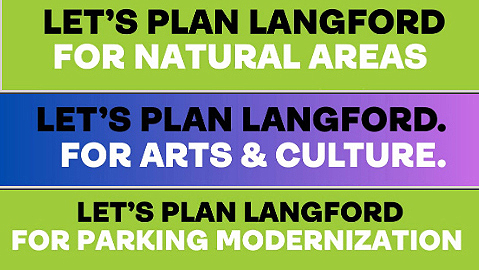In a move that mirrors the city’s rapid evolution, Langford is turning to its residents for guidance on three key aspects of community development: natural spaces, parking solutions, and arts and culture initiatives. The suburban West Shore municipality, which has transformed dramatically over the past decade, launched this public consultation process last week, signaling a shift toward more community-driven planning.
“We’ve reached an important juncture in Langford’s growth story,” says Councillor Kimberley Guiry, who chairs the city’s Parks and Recreation Committee. “Our residents live here because they value both our urban amenities and natural surroundings. Now we need their input to balance these priorities effectively.”
The consultation arrives at a time when Langford faces increasing pressure to preserve its remaining green spaces while accommodating a population that has swelled by nearly 32% since 2016, according to Statistics Canada figures. The city’s traditional development-forward approach has delivered housing and commercial growth but has also sparked community concerns about the pace of tree removal and habitat loss.
Walking through Centennial Park, longtime resident Margaret Holloway points to recently added trail improvements while lamenting the loss of wooded areas elsewhere in the city. “Langford used to be all trees and lakes. I understand we need housing, but we can’t pave everything. We need these spaces for our mental health and for future generations.”
The natural spaces survey asks residents to identify priority areas for conservation, recreational preferences for parks, and the balance they want to see between developed parkland and preserved natural areas. This comes after the city’s newly established Environment Committee began work earlier this year to develop Langford’s first comprehensive environmental protection strategy.
Parking concerns represent another focal point for public input. The densification of Langford’s downtown core has created challenges for businesses and visitors alike, with weekend congestion at Goldstream Avenue establishments becoming increasingly common.
Jason Martins, who operates a café in Langford’s central business district, describes the weekend parking situation as “increasingly difficult” for his customers. “Five years ago, parking wasn’t even a consideration. Now I hear about it from patrons every weekend. The city needs solutions that work for both businesses and residents.”
The parking survey explores potential solutions including expanded municipal lots, permit systems for residential streets near commercial zones, and incentives for alternative transportation options. It notably arrives as BC Transit continues work on its new bus exchange near Station Avenue, expected to enhance public transit connections throughout the West Shore.
Perhaps the most forward-looking aspect of the consultation involves arts and culture development, representing Langford’s growing interest in building community identity beyond commercial expansion. The city established its first Arts, Culture and Heritage Committee in 2022, which has been exploring strategies to incorporate more public art, performance spaces, and cultural programming.
“Communities need more than just housing and shops to thrive,” explains Carmen Rodriguez, who leads the recently formed Langford Arts Collective. “As our population grows more diverse, we need spaces that celebrate creativity and bring people together. Other West Shore communities like Colwood have developed significant arts infrastructure—Langford needs to catch up.”
The arts and culture survey explores residents’ priorities for potential investments ranging from a dedicated performing arts venue to expanded festival programming and public art installations. It also gauges interest in programming that would reflect the community’s growing cultural diversity.
Mayor Scott Goodmanson has emphasized that the consultation process represents a more collaborative approach to community planning. “Langford’s success story has been built on growth and opportunity, but sustainable communities require more than just development. These surveys will help council make decisions that truly reflect the values and aspirations of our residents.”
The three-pronged consultation approach marks a notable shift for a municipality that has historically prioritized development efficiency over extended public engagement processes. Critics of past administrations often cited limited consultation as a pain point, particularly regarding environmental decisions.
Environmental advocate Trevor Williams, who has frequently addressed council on conservation issues, sees the consultation as a positive step. “For years, many of us felt decisions were made before public input was even sought. This approach suggests the new council is genuinely interested in what residents want for their community’s future.”
The city has made the surveys available through its website and at municipal facilities until October 15th. Staff will then compile results for presentation to council committees before the end of the year, with implementation strategies expected to be incorporated into 2024 budget planning.
As Langford continues its transition from a bedroom community to a regional urban center, these consultations may prove pivotal in determining whether its next development chapter more deeply reflects community values. For a city that built its reputation on rapid growth and business-friendly policies, this more measured approach to planning represents its own kind of evolution.






